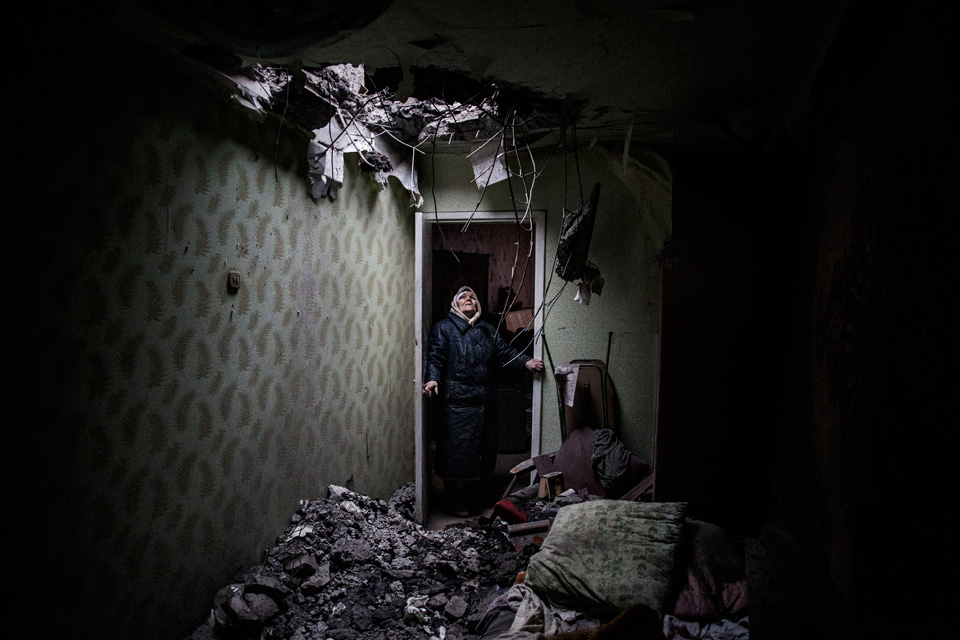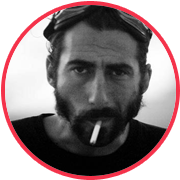
Manu Brabo: “My Goal is to Shed Light on What’s Happening at the Gates of Europe”
(Cover photo: Galina, age 86, looks at the hole in her house that happened as a result of a shell strike in Kievskij district, Donetsk. 21 January 2015. Captions herein and after belong to the author.)
The experienced Spanish photojournalist Manu Brabo has photographed catastrophes and wars in Honduras, Bolivia, Kosovo, and the Middle East. In the spring of 2011, he and a group of journalists were detained in Libya by forces loyal to Muammar Gaddafi and spent a month and a half in prison. In 2013 Brabo won the prestigious Pulitzer Prize for his photos from Syria.
Brabo’s work in a Ukraine began in Crimea. Soon afterwards he set out to cover the conflict in Eastern Ukraine. Brabo’s photos have been published in The Washington Post, The New Yorker, Al Jazeera, Paris Match, and other publications. He created ME-MO, an Internet photography journal, with some of his photographer colleagues while between travels, and the journal was released in January of this year. Brabo spoke to Bird In Flight about what advantages his journal has over other Internet publications and about what it’s like to cover a war.

Half a year passed between your trips to Eastern Ukraine. What changed during that period?
The war started. In May everything was up in the air. It was really strange because it was hard for me to work. Sometimes I didn’t understand what was going on at the Ukrainian and pro-Russian checkpoints. It was all confusing. In January I saw that there was at least a clear line with each side under the corresponding authority. And, of course, there were a lot of attacks, winter, and innocent civilians living under horrible conditions. The difference between May and January is the difference between protest, revolt and war.
{“img”: “/wp-content/uploads/2015/04/brabo01.jpg”, “alt”: “Ману Брабо”, “text”: “Pro-Russian soldiers examine their position three kilometers away from the airport in Kievskij district, Donetsk. January 22, 2015.”}
Why were you filming a lot of civilians?
I’ve worked on a lot of wars over the past four years. In general, innocent civilians are the ones who suffer the most. No one at all ever thinks about these people. I go to the places under attack and suffering starvation, the places without heating. People are living under wartime conditions. Frankly, there are a lot of people there about whom Putin and Poroshenko don’t give a shit about. But these people just want peace and to raise their children. The soldiers take up positions in resident blocks, they fight each other and innocent people die. War isn’t exactly fair like that. But in the end it’s the honest people who pay for it.
I heard that for a lot of journalists, Debaltsevo was an especially tough time.
Debaltsevo definitely wasn’t the most dangerous experience in my life, but the situation there was awful for the residents. This is important to show – how women and children were running away from the city. Of course, I can’t say that it was easy for me. What’s more interesting is that this was the first war in which I could work from both sides.
{“img”: “/wp-content/uploads/2015/04/warning-eng.jpg”, “alt”: “”, “text”: “”},
{“img”: “/wp-content/uploads/2015/04/brabo02.jpg”, “alt”: “Ману Брабо”, “text”: “A woman mourns her relative killed in the Kirovskij district of Donetsk during shelling suspectedly by the Ukrainian army. January 22, 2015”}
{“img”: “/wp-content/uploads/2015/04/brabo03.jpg”, “alt”: “Ману Брабо”, “text”: “Elderly women in a bomb shelter in Oktyabrskij district, Donetsk. January 27, 2015.”}
Did you have any problems working with either side?
It was easy enough to work with both of them. In general, everyone respected real accreditations, and if someone didn’t want you to go somewhere, they just said “No.” Everything was fine if you had permission and you weren’t trying to do something you weren’t supposed to. Sometimes, of course, there are difficulties in covering some topics because you can’t get access to a particular place, and this affects the work.
What was your personal goal in this war?
I don’t have personal goals. My only goal is to shed light on the situation with innocent civilians and to inform people on what’s happening at the gates of Europe and the European Union.
What things haven’t photographers filmed in Donbass yet?
I think that more than enough people are working there. There are a ton of Ukrainian and Russian photojournalists doing unbelievable work and, of course, foreign photographers as well. The problem is that only the publications get to decide which conflict is interesting and which one isn’t. It seems like, since the last “ceasefire” agreement, the media has switched to other topics. However, a lot of dedicated journalists continue to work in Donbass.
{“img”: “/wp-content/uploads/2015/04/warning-eng.jpg”, “alt”: “”, “text”: “”},
{“img”: “/wp-content/uploads/2015/04/brabo04.jpg”, “alt”: “Ману Брабо”, “text”: “A man cries at the funeral of his four-year-old son, Artem, who perished when an artillery shell, fired by the Ukrainian army, struck their house. January 22, 2015.”}
{“img”: “/wp-content/uploads/2015/04/brabo05.jpg”, “alt”: “Ману Брабо”, “text”: “Pro-Russian rebels hide in a basement during Ukrainian army shelling, three kilometers away from Donetsk Airport. January 22, 2015.”}
Why did you choose to photograph wars?
I always knew that I wanted to be useful to humanity and to do something positive. I had skills in photography, so I decided to use them precisely in this kind of work. Thanks to this I feel complete and necessary to society.
Did the 45 days in prison affect your later work in any way?
Yes. And if it didn’t affect it, it would have been weird. I wouldn’t like to pay such a price again. I’m lucky that I survived. And yes, you change yourself and learn from it, just like during any task. It’s all about learning and luck. If it’s very dangerous, I just decide not to go. I’m almost certain that after 15 or 20 years I’ll be fed up with this work and tired of the constant risk. But the next generation of youth will be covering the wars then.
Is it possible to study how to film a war and use the experience from one war during another one?
Each war is different. Wars have a lot of things in common, but also a lot of differences. We have to learn how to be at once reasonable and lucky. Also, it is important to have the ability to observe things well, because this is the only way to understand the peculiarities of each conflict. I think that no one can ever get enough experience working in a war. If someone tells me that he knows how to work in a war, this person is possibly not a journalist, but a soldier.
{“img”: “/wp-content/uploads/2015/04/warning-eng.jpg”, “alt”: “”, “text”: “”},
{“img”: “/wp-content/uploads/2015/04/brabo06.jpg”, “alt”: “Ману Брабо”, “text”: “Two pro-Russian rebels look at the body of an elderly man, killed by a Ukrainian shell that hit a bus stop in Kievskij district, Donetsk. January 22, 2015.”}
{“img”: “/wp-content/uploads/2015/04/brabo07.jpg”, “alt”: “Ману Брабо”, “text”: “Ukrainians dive in an ice hole on the feast of the Epiphany. Lake at Shcherbakova Park, Donetsk, January 19, 2015.”}
How did winning the Pulitzer affect your work?
I feel a lot more responsibility now when I go on shoots. Sure, the Pulitzer Prize can help me get more grants or work, but the things that really changes my career is tough work and the passion I have for it.
The first issue of your new interactive journal, ME-MO, is dedicated to fear. What fears do you have?
The worst thing that could happen is when someone takes your photo and tries to impress a different meaning on it. My big fear is being misunderstood, because the meaning in my work is to shed light on what’s happening, and sometimes I have to risk my life for it. But at the end you work can be used for political goals. Propaganda works on both sides, of course.
What’s special about ME-MO?
Stories will be much deeper and wider. We’re not mainstream: there are no commercial or economic interests in ME-MO. We’re a small magazine, but our idea is to tell stories exactly how we saw them in the field. This is often not the case in other forms of media. People who read the next issue will understand much more deeply what’s going on in Ukraine (Manu Brabo’s material on Ukraine will be published in the next issue. – Ed.).
{“img”: “/wp-content/uploads/2015/04/brabo08.jpg”, “alt”: “Ману Брабо”, “text”: “A baker’s blood, killed during Ukrainian army shelling. One of the shells landed in this store in Semashko district, Donetsk. January 22, 2015.”}
You opened an exhibition on Syria. Are people more sensitive to photos depicting violence? And how does the exhibition change one’s perception?
There will always be people who are touched by these kinds of photos. Others won’t give a shit. Some will think that I’m trying to interfere in people’s lives with my work. I’ll say something about myself – I have a lot of experience covering wars, but to this day I’m very sensitive about such things. The exhibition might be able to change perception because all of those photos are my choices. They’re not the same pictures you see in mass media, and many of them have never been seen before. This is much more powerful, that I’m showing a photo that no one else wants to show. People must understand that war is not beautiful and not fun, and they’ll get this sense at the exhibition. War is hell. People die. It’s nothing good.
{“img”: “/wp-content/uploads/2015/04/brabo09.jpg”, “alt”: “Ману Брабо”, “text”: “A deserted checkpoint in Proletarskij district on the edge of Donetsk. January 17, 2015.”}
New and best




